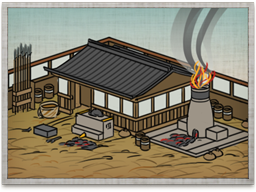Difference between revisions of "Siege Engineer's Workshop (TWS2)"
m |
m |
||
| Line 1: | Line 1: | ||
| − | {{Building | + | {{TWS2 Building|image=[[Image:Siege Engineer's Workshop S2TW.png]] |
|Chain=Siege Type | |Chain=Siege Type | ||
|Requires='''Arts''':<li>[[Strategy of Attack]]</li> | |Requires='''Arts''':<li>[[Strategy of Attack]]</li> | ||
Revision as of 08:31, 21 December 2011
| Siege Engineer's Workshop (TWS2) | |
|---|---|
 | |
| Chain | Siege Type |
| Requires | Arts: |
| Enables | Buildings: |
| Spawned Defence Forces | - |
| Basic Building Statistics | - |
| Clan Effects | - |
| See main article; FotS Buildings | |
Description
The smith bends iron to his will; the gunner, the enemy.
This building allows the construction of basic siege engines. Sooner or later a castle will need to be reduced or breached, and then taken from the enemy. The defending commander may even decide that his best course is to sit out the siege. It is at this point that an attack needs a really big weapon to break down the enemy walls.
Sieges often required quite advanced military engineering on the part of the attackers. At Noda Castle in 1573, when a corps of miners with the attacking Takeda army drained the moat, the defenders lost their water supply too. It was only the shooting of Lord Takeda Shingen by a sniper that halted the attack. However, there was also a notable tendency for Japanese garrisons to leave their castles and attack their besiegers. It was not always considered honourable to cower behind the walls when there was a clean fight to be had with your tormentors outside! It was quite possible for the besieging army to capture a castle almost intact, because the defenders had been terribly obliging and come out into the field to be killed in an honourable way. On the other hand, some garrisons were remarkably tenacious: at Odawara in 1561, the castle held out for two months, despite the town around it being burned to the ground.